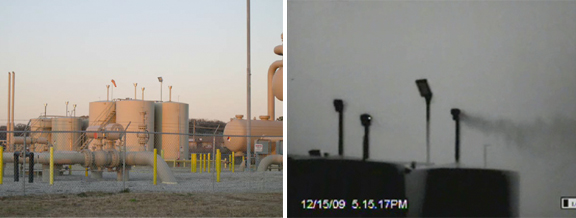Question: When does air quality testing not clear the air?
Answer: These days, almost any time that Texas’ lead environmental agency is doing the testing in the Barnett Shale.
 That’s still the situation in Fort Worth, following air quality tests done last month by the Texas Commission on Environmental Quality near natural gas sites here. The test results showed no high levels of pollutants and “no cause for concern,” or so TCEQ told city officials at a Jan. 12 city council presentation, prompting Fort Worth Mayor Mike Moncrief to express gratitude that local residents are in “no immediate danger.”
That’s still the situation in Fort Worth, following air quality tests done last month by the Texas Commission on Environmental Quality near natural gas sites here. The test results showed no high levels of pollutants and “no cause for concern,” or so TCEQ told city officials at a Jan. 12 city council presentation, prompting Fort Worth Mayor Mike Moncrief to express gratitude that local residents are in “no immediate danger.”
The test’s validity, however, is being challenged on numerous fronts. Critics pointed to a disclaimer about the test methods that some believe renders the results meaningless. Others raised questions about whether the testing might have been paid for with energy-industry money or performed by industry-friendly consultants. The basis in part for those concerns: TCEQ’s own reports and statements allegedly made by their officials.
Critics who view city leaders and the state’s environmental staff as protectors rather than watchdogs of the energy industry described the presentation as a dog and pony show led by Moncrief. “It was a fiction, a play put on for the media to convince Fort Worth residents there is nothing to worry about,” activist Don Young said.
The state agency shared the results in a Power Point presentation, but few in the audience could see the disclaimer written in small letters at the bottom, and city officials didn’t mention it.
“This data is for screening purposes only and may include samples that did not meet the established quality control acceptance criteria,” the disclaimer said. “This data was not collected, analyzed, or reviewed using the documented quality assurance/quality control protocols defined in the Laboratory and Mobile Monitoring Quality Manual or those defined by the National Environmental Laboratory Accreditation Conference 2003.”
Such a disclaimer discredits the test completely, said a local scientist who performed independent tests near DISH that revealed a high level of toxic air pollutants near natural gas sites.
“That disclaimer is the most absurd statement I’ve seen in a very long time,” said Alisa Rich, environmental scientist at Wolf Eagle Environmental.
Rich followed Environmental Protection Agency quality-assurance protocols in her tests that revealed airborne carcinogens at levels that exceeded state standards. The state’s testing in Fort Worth didn’t follow federal or state protocols.
TCEQ spokesman Terry Clawson said the test results were accurate and valid, despite the disclaimer. The only reason normal protocols weren’t followed was to speed up the results, he said.
“We were trying to do that really fast. If you are going to do testing and use certified labs and have it legal quality, that takes a long time,” he said.
The tests were done Dec. 15-17 in Fort Worth after Moncrief admonished state officials for the agency’s lack of air quality testing in Fort Worth.
TCEQ’s critics say the state’s response to questions about the disclaimer is a typical example of doublespeak by that agency.
“If quality assurance/quality control is not performed correctly, results are inaccurate and flawed – in other words, meaningless,” Rich said. “They would never accept a study with improper quality assurance/quality control. Nor should we.”
The city of DISH spent 15 percent of its entire annual budget to pay for an independent air test using federal standards, after residents grew tired of the state’s inaction. After the Wolf Eagle results were released last summer, the state agency arrived in the fall to do its own testing. However, Tillman said he lost interest in the state’s tests after an agency official said the gas industry would be providing funding and an industry-related third-party consultant would perform air tests.
“The industry and TCEQ have earned the mistrust they’ve been getting,” Tillman said.
Tempers among DISH residents were high during a Dec. 14 meeting in their town with TCEQ officials who were explaining their plans for testing and monitoring the air. City officials complained that their calls to TCEQ to report pollutants or to ask for information were returned by employees of gas drilling and pipeline companies rather than by state employees.
“In DISH, I formally opposed any testing that had any funding from any industry source,” Tillman said. “If it wasn’t funded by TCEQ, I didn’t want it. The industry … is not looking for a way to make their operations better, they are looking for a way to cut holes in our data.”
Also at that meeting, TCEQ’s chief engineer for air quality, Susana Hildebrand, and other TCEQ representatives told the crowd that the agency was short on money to perform tests in the Barnett Shale.
Fort Worth Weekly e-mailed TCEQ spokeswoman Andrea Morrow, asking whether the gas industry had paid for the Fort Worth tests and for an explanation of how the agency was able to perform those tests beginning a day after the agency staffers had made those statements to the DISH folks.
“We disagree with your characterization of the meeting in DISH and of your total disregard for the nature and context of Ms. Hildebrand’s statements,” Morrow responded. “Most of your questions can be answered on the web page I directed you to.”
The links she provided to the web site, however, did not answer most of the questions she’d been asked. A phone call to Morrow for clarification ended with her referring questions to Clawson and then hanging up on the reporter.
The industry offered to pay for the state’s tests in DISH, but the agency refused the money and relied on its own funding and employees for testing in the Barnett Shale, Clawson said. He too denied that state officials said at the Dec. 14 meeting in DISH that the energy industry was subsidizing tests. In the past, the industry has taken air samples in Houston and posted its results on the agency’s web site, but the industry has not been involved in testing in DISH or Fort Worth, said Clawson, who attended the meeting.
“No testing that has been done up there in the area has had any participation with the oil and gas industry,” he said.
Yet a recording of the meeting reveals Hildebrand saying the industry would pay for tests but not be involved in the monitoring process. “We’re just taking their money in order to fund it,” she said.
Clawson said the industry had offered to pay for tests, but TCEQ refused its help after DISH residents objected. “That was just a proposal,” he said.
DISH’s mayor, however, said agency representatives have told him numerous times, including as recently as last week, that the energy industry provides consultants and funding for TCEQ tests. He said the state’s tests in DISH included participation from a member of the Texas Pipeline Association, a trade association representing the interest of pipeline companies.
Misleading and contradictory statements from state air quality officials are nothing new, Tillman said.
“As far as I’m concerned, TCEQ is part of the industry,” he said.
And he suggested Fort Worth officials try to verify the test results before accepting the state’s conclusion that all is well in the air surrounding the city’s hundreds of gas wells. Independent tests in Flower Mound and DISH have shown much higher levels of air pollutants.
“This study they did on the city of Fort Worth in December has a disclaimer that says ‘This isn’t worth the paper it’s written on,’ ” he said. “The [Wolf Eagle] air study doesn’t have a disclaimer on it.”
The startling results of the independent tests in DISH, combined with the growing furor among residents, will push the state to eventually crack down on polluters in that rural burg, he said.
But he predicted that Fort Worth won’t push that hard.
“The political climate is different,” he said. “If you go into Fort Worth and find benzene at 15 parts per billion, which is like holding a can of gas under your nose, you’re going to have a whole lot of people outraged. If you find benzene in Fort Worth you have 700,000 people screaming for moratoriums and filing lawsuits. You’re going to have a hard time getting TCEQ to find anything in Fort Worth.”
Some residents here have repeatedly asked the city to temporarily call a halt to drilling until further air testing can be done. Moncrief ended the TCEQ presentation by asking a state official whether he saw any need to issue such a moratorium. The official said he saw no reason to do so.
Then, on Saturday, WFAA/TV-Channel 8 aired a report casting more doubt on the state’s tests. TCEQ deputy director John Sadlier told city officials on Jan. 12 that no traces of benzene, a powerful carcinogen, were detected at the 126 gas well sites visited during the three-day testing period. But Channel 8 reported that benzene testing wasn’t even performed at 118 of those sites.
City spokesman Jason Lamers said he spoke with TCEQ on Monday and asked about the testing process. “They stand by everything they told the city council, and they believe the air is safe according to the tests they’ve done,” he said.
Moncrief and other city leaders are calling for continuous air testing and monitoring by the state, but are not seeking independent testing.
“We are relying on TCEQ to give us the best information,” Lamers said. But, he added, the December testing done by the state was “a snapshot and not a definitive study or review.”











